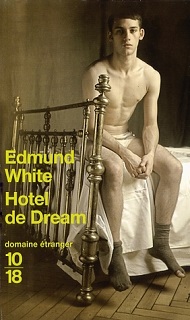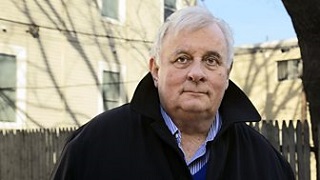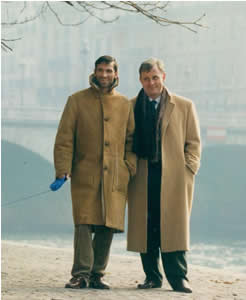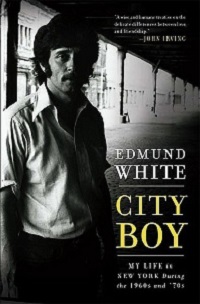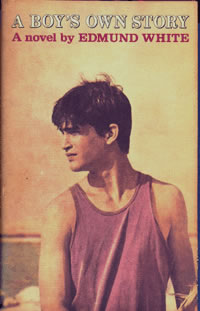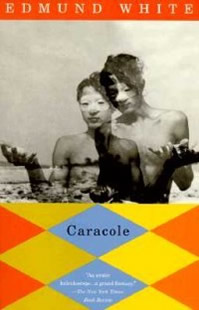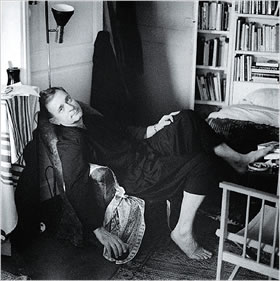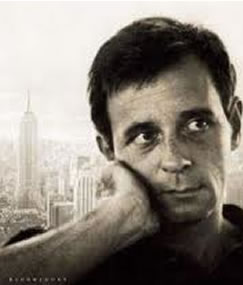De Amerikaanse schrijver en essayist Edmund White werd geboren op 13 januari 1940 in Cincinnati. Zie ook alle tags voor Edmund White op dit blog.
Uit:The Unpunished Vice
“Reading is at once a lonely and an intensely sociable act. The writer becomes your ideal companion – interesting, worldly, compassionate, energetic – but only if you stick with him or her for a while, long enough to throw off the chill of isolation and to hear the intelligent voice murmuring in your ear. No wonder Victorian parents used to read out loud to the whole family (a chapter of Dickens a night by the precious light of the single candle); there’s nothing lonely about laughing or crying together – or shrinking back in horror. Even if solitary, the reader’s inner dialogue with the writer – questioning, concurring, wondering, objecting, pitying – fills the empty room under the lamplight with silent discourse and the expression of emotion.
Who are the most companionable novelists? Marcel Proust and George Eliot; certainly they’re the most intelligent, able to see the widest implications of the simplest act, to play a straightforward theme on the mighty organs of their minds: soft/loud, quick/slow, complex/chaste, reedy/ orchestral. But we also cherish Leo Tolstoy’s uncanny empathy for diverse people and even animals, F. Scott Fitzgerald’s lyricism, Colette’s worldly wisdom, James Merrill’s wit, Walt Whitman’s biblical if agnostic inclusiveness, Annie Dillard’s sublime nature descriptions. When I was a youngster I loved novels about the Lost Dauphin or the Scarlet Pimpernel or the Three Musketeers – adventure books enacted in the clear, shadowless light of Good and Evil.
If we are writers, we read to learn our craft. In college I can remember reading a now-forgotten writer, R.V. Cassill, whose stories showed me that a theme, once taken up, could be dropped for a few pages only to emerge later, that in this way one could weave together plot elements. That seems so obvious now, but I needed Cassill to teach me the secrets of polyphonic development. In her extremely brief notes on writing, Elizabeth Bowen taught me that you can’t invent a body or face – you must base your description on a real person. Bowen also revealed how epigrams can be buried into a flowing narrative. She said that in dialogue people are either deceiving themselves or striving to deceive others and that they rarely speak the disinterested, unvarnished truth. Henry James’s The Turn of the Screw showed me how Chinese-box narrators can destabilize the reader sufficiently to make a ghost story seem plausible.”
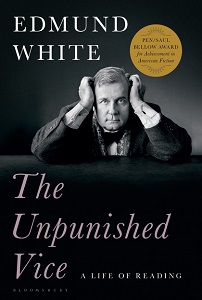
Edmund White (Cincinnati, 13 januari 1940)
Cover
De Duitse schrijver Daniel Kehlmann werd op 13 januari 1975 in München geboren. Zie ook alle tags voor Daniel Kehlmann op dit blog.
Uit:Tyll
„Auf dem Wagen war ein Zelt aus rotem Segeltuch aufgeschlagen. Davor kauerte eine alte Frau. Ihr Körper sah wie ein Beutel aus, ihr Gesicht wie aus Leder, ihr Augenpaar wie winzige schwarze Knöpfe. Eine jüngere Frau mit Sommersprossen und dunklem Haar stand hinter ihr. Auf dem Kutschbock aber saß ein Mann, den wir erkannten, obgleich er noch nie hier gewesen war, und als die Ersten sich erinnerten und seinen Namen riefen, erinnerten sich auch andere, und so rief es bald von überall und mit vielen Stimmen: «Tyll ist hier!», «Tyll ist gekommen!», «Schaut, der Tyll ist da!» Es konnte kein anderer sein. Sogar zu uns kamen Flugschriften. Sie kamen durch den Wald, der Wind trug sie mit sich, Händler brachten sie – draußen in der Welt wurden mehr davon gedruckt, als irgendwer zählen konnte. Sie handelten vom Schiff der Narren und von der großen Pfaffentorheit und vom bösen Papst in Rom und vom teuflischen Martinus Luther zu Wittenberg und dem Zauberer Horridus und dem Doktor Faust und dem Helden Gawain von der runden Tafel und eben von ihm, Tyll Ulenspiegel, der jetzt selbst zu uns gekommen war. Wir kannten sein geschecktes Wams, wir kannten die zerbeulte Kapuze und den Mantel aus Kalbsfell, wir kannten sein hageres Gesicht, die kleinen Augen, die hohlen Wangen und die Hasenzähne. Seine Hose war aus gutem Stoff, die Schuhe aus feinem Leder, seine Hände aber waren Diebes- oder Schreiberhände, die nie gearbeitet hatten; die rechte hielt die Zügel, die linke die Peitsche. Seine Augen blitzten, er grüßte hierhin und dorthin. «Und wie heißt du?», fragte er ein Mädchen. Die Kleine schwieg, denn sie begriff nicht, wie es sein konnte, dass einer, der berühmt war, mit ihr sprach. «Na sag es!» Als sie stockend herausgebracht hatte, dass sie Martha hieß, lächelte er nur, als hätte er das immer schon gewusst.
Dann fragte er mit einer Aufmerksamkeit, als wäre es ihm wichtig: «Und wie alt bist du?» Sie räusperte sich und sagte es ihm. In den zwölf Jahren ihres Lebens hatte sie nicht Augen gesehen wie seine. Augen wie diese mochte es in den freien Städten des Reichs geben und an den Höfen der Großen, aber noch nie war einer, der solche Augen hatte, zu uns gekommen. Martha hatte nicht gewusst, dass solche Kraft, solche Behändigkeit der Seele aus einem Menschengesicht sprechen konnten. Dereinst würde sie ihrem Mann und noch viel später ihren ungläubigen Enkeln, die den Ulenspiegel für eine Figur alter Sagen hielten, erzählen, dass sie ihn selbst gesehen hatte.“

Daniel Kehlmann (München, 13 januari 1975)
De Amerikaanse schrijver Jay McInerney werd geboren op 13 januari 1955 in Hartford, Connecticut. Zie ook alle tags voor Jay McInerney op dit blog.
Uit: Bright, Precious Days
“And if the realities of urban life and the pub-lishing business had sometimes bruised his romantic sensibilities, he never relinquished his vision of Manhattan as the mecca of American literature, or of hi msel f as an acolyte, even a priest, of the written word. One delirious night a few months after he arrived in the city, he accom-panied an invited guest to a Paris Review party in George Plimpton’s town house, where he shot pool with Mailer and fended off the lisp-ing advances of Truman Capote after snorting coke with him in the bathroom. Though the city after three decades seemed in many ways dimin-ished from the capital of his youth, Russell Calloway had never quite Fallen out of love with it, nor with his sense of his own place here. The backdrop ofManhattan, it seemed to him, gave every gesture an added grandeur, a metropolitan gravitas. Not long after he became an editor, Russell had published his best friend Jeff Pierce’s first book—a collection of stories; and then, afterJeff died, his novel, two of the main characters in which—it could not be denied—were inspired by Russell and his wife, Corrine. Editing that book would have been difficult enough, given its not-quite-finished state, even if it hadn’t involved a love triangle featuring a married couple and their closest friend, but Russell was proud of the scrupulous, sometimes painful professionalism with which he’d tried to implement Jeff’s intentions. The novel, Youth and Beauty, was generously praised by the critics—including several who’d been unkind about his debut—as books by recently deceased authors often are, especially those who die young and in a manner that confirms the myth of the artist as a self-destructive genius. Even before the book was published there was spirited bidding for the film rights. It sold well in hardcover and again, a year later, in paperback, and then its sales fell off, dwindling into the double digits a few years back, its author little more than a name associated with the period of big hair and big shoulder pads, yet another of the victims of the great epidemic that scythed the ranks of the artistic community, although, as a heterosexual, he didn’t really fit the profile of the plague narrative and his fiction had more in common with that of James Gould Cozzens or John O’Hara than with the high-gloss, coke-fueled prose of his famous contemporaries. Over time his reputation faded like the Polaroids from their days at Brown. Then, gradually, almost inexplicably, the book and its author had been resurrected. This process first came to Russell’s attention with a long essay in the inaugural issue of a magazine called The Believer, which Jonathan Tashjian, his PR director, had shown him.”
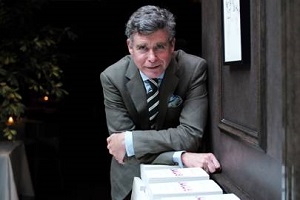
Jay McInerney (Hartford, 13 januari 1955)
De Amerikaanse schrijfster Lorrie Moore werd geboren op 13 januari 1957 in Glens Falls, New York. Zie ook alle tags voor Lorrie Moore op dit blog.
Uit;You‘re Ugly, Too
“You had to get out of them occasionally, those Illinois towns with the funny names: Paris, Oblong, Normal. Once, when the Dow Jones dipped two hundred points, a local paper boasted the banner headline “NORMAL MAN MARRIES OBLONG WOMAN?’ They knew what was important. They did! But you had to get out once in a while, even if it was just across the border to Terre Haute for a movie. Outside of Paris, in the middle of a large field, was a scatter of brick buildings, a small liberal-arts college by the improbable name of Hilldale-Versailles. The Hendricks had been teaching American history there for three years. She taught “The Revolution and Beyond” to fresh men and sophomores, and every third semester she had the senior seminar for majors, and although her student evaluations had been slipping in the last year and a half — Professor Hendricks is often late /or class and usually arrives with a cup of hot chocolate, which she offers the class sips of — generally the department of nine men was pleased to have her. They felt she added some needed feminine touch to the corn dors — that faint trace of Obsession and sweat, the light, fast clicking ‘of heels. Plus they had had a sex-discrimination suit, and the dean had said, well, it was time. The situation was not easy for her, they knew. Once, at the start of last semester, she had skipped into her lecture hall singing “Getting to Know You” — all of it. At the request of the dean, the chairman had called hei c into his office, but did not ask her for an explanation, not really. He asked her how she was and then smiled in an avuricyt way. She said, “Fine,” and he studied the way she said it, her front teeth catching ou the inside of her lower lip. She was almost pretty, but her face showed the strain and ambition of always having been close but not quite. There was too much effort with the eyeliner, and her earrings, worn, no doubt, for the drama her features lacked, were a little frightening, jutting out the sides of her head like antennae. “I’m going out of my mind: said Zoe to her younger sister, Evan, in Manhattan. Professor Hendricks seems to know the entire soundtrack to “The King and I.” Is this history? The phoned her every Tuesday. “You always say that,” said Evan, “but then you go on your trips and vacations and then you settle back into things and then you’re quiet for a while and then you say you’re fine, you’re busy, and then after a while you say you’re going crazy again, and you start all over?’
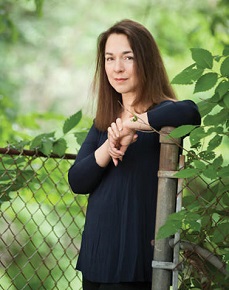
Lorrie Moore (Glens Falls, 13 januari 1957)
De Nederlandse historicus en dichter Jan de Bas werd geboren op 13 januari 1964 in Waddinxveen. Zie ook alle tags voor Jan de Bas op dit blog.
Huismus
Vaak te gewoon voor woorden.
Van hoopje veren tot
een vliegend stukje grijs
fladdert rond het vaderhuis.
Doodeenvoudig is hij niet.
Een mus verbergt geheimen
die hem meegeschapen zijn.
In zijn ooghoek drukt dat feit.
Een vogel met verdriet,
die twee keer eet dat wat hij weegt.
En toch is hij niet zwaar.
Hij torst een licht gemis.
Gevonden
Een man leest een gedicht,
vergeet het over te schrijven
en gooit het weg.
Een dag later mist hij het gedicht
als zijn allergrootste liefde,
zijn toeverlaat, zijn steun.
Hij zoekt naar de zinnen,
de woorden, de komma’s, de punten.
Het blijft een groot vraagteken.
Waar is het gebleven?
Ligt het al in de vuilniswagen?
Rijdt dat gore ding rond
met zijn allerschoonste gedicht?
Hij bidt en hij smeekt.
Hij hoopt op een wonder,
gaat op zijn knieën,
een pen in de hand.
Langzaam ontstaat er een zin,
een strofe, een gloednieuw gedicht
over zijn grote verdriet:
het onbereikbare vers.
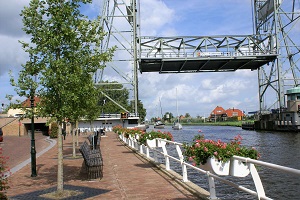
Jan de Bas (Waddinxveen, 13 januari 1964)
Waddinxveen, de hefbrug
De Argentijnse schrijver en regisseur Edgardo Cozarinsky werd geboren 13 januari 1939 in Buenos Aires. Zie ook alle tags voor Edgardo Cozarinsky op dit blog.
Uit: Natalia Franz (Vertaald door Dario Bard)
“I had been observing her for some time. Openly at first, not hiding my fascination with her face, which appeared to be designed by scalpel. Later, my glances were furtive; I was afraid that my staring would make her uncomfortable, although she seemed not to notice.
When she was invited out on the dance floor, however, I felt free to unabashedly admire her tall, slender figure, the elegant casualness of her movements, the grace with which she held her head high on a delicate neck that was revealed and then concealed by her ash-blond hair as it bobbed to the rhythm of the music. But it was her face, barely corrected with makeup, that caught my eye; there were traces of where the artificial merged with the monstrous, resulting unexpectedly in a sort of Medusa-like beauty (as Praz would put it): sunken eyes that seemed to have awakened in skin other than the one they were born in; cheekbones and arches over the eyebrows that were overly pronounced, as if sculpted from non-malleable material; full but swollen-looking lips that lacked the sensuality that plastic surgery promises.
I watched her slowly sip her champagne. She didn’t pay much attention to those around her and was always accompanied by a young girl with plain looks and a timid smile, irreparably devoid of any charm, of that glimmer of mystery that makes many non-pretty women attractive. I was reminded—an old reader of James never sleeps—of “The Beldonald Holbein,” that story wherein Lady Beldonald, a mature beauty who thinks herself clever, seeks to enliven her waning looks by having a wrinkled old lady, marked by misfortune, accompany her at social events. Her artist friends, fascinated by a face that looks as if it came straight out of a Holbein, only have eyes for her companion and soon recruit her as a model. Lady Beldonald learns her lesson: the following season, she appears in London accompanied by a young, not particularly ugly, but dreadfully dull girl.
Had the object of my curiosity perhaps arrived at a similar conclusion?
One night we were seated at neighboring tables. I thought I knew how to mask my curiosity, but eventually she caught me with my eyes fixated on that surgical achievement framed by her straight, loose hair. She didn’t seem annoyed; on the contrary, she gave a hint of a smile.”
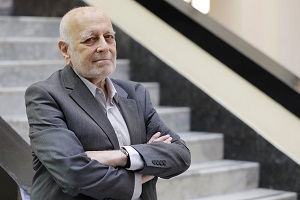
Edgardo Cozarinsky (Buenos Aires, 13 januari 1939)
Cover
De Iraanse schrijver Mohammad-Ali Jamālzādeh Esfahani werd geboren op 13 januari 1892 in Isfahan. Zie ook alle tags voor Mohammad-Ali Jamālzādeh op dit blog.
Uit: Persian Is Sugar (Vertaald door Heshmat Moayyad en Paul Sprachman)
“These words caused the reverend sheikh’s turban to glide slowly like a wisp of cloud. A pair of eyes emerged from it and peered feebly at the felt-hatted provincial. From the phonic defile that, though not vis-ible, must have been below the eyes, with perfect declamation and composure these words made their way slowly and deliberately to his assembled audience: “Believer! Deliver ye not the reins of thy rebelious and weak soul to anger and rage, for ‘Those who control their wrath and are forgiving toward mankind. . . ” The sheikh’s speech stunned the felt-hatted boy. Recognizing only the word “Kazem” in “Those who control .. .,” he said, “No, Rever-end, your servant’s name isn’t Kazem, it’s Ramazan. I only meant to say that we could at least know why we’ve been buried alive.” This time, with the same consummate declamation and composure, these words emanated from the holy precinct: “May God reward ye who believe. The point is well taken by your advocate’s intellect. `Patience is the key to release.’ Spew that the object of our imprison-ment shall become manifest ex tempore; but whatever the case, whether sooner or later, it most assuredly will reach our ears. Interea,* while we wait, the most profitable occupation is to recite the name of the Cre-ator, which in any event is the best of endeavors.” Ramazan, poor bastard, didn’t catch a word of the reverend sheikh’s sweet Persian. He thought that His Eminence was communing with jinn or spirits or was busy reading Scripture to the dead; terror and dread marked his face. He said “Bismillah”t faintly and prepared to retreat, but it appeared that the sheikh’s venerable jaw was just getting warmed up. Without addressing anyone in particular, he stared at a spot on the wall and, again with the customary declamation, picked up the thread of his thoughts, “Perhaps,” he pontificated, “our arrest was a matter of expedience or perhaps it was essentially unintentional, in which case it is strongly hoped that it will come to an end, if not immediately, shortly. Or, perhaps, considering this humblest of beings quasi nullus essem, they will expose me in the worst way possible to gradual ruin and perdition without heeding my dignity or station; therefore it is up to us to appeal to higher authorities in whatever way, with intermediaries or without others’ intervention, in writing or ver-bally, openly or in secret—and, without doubt, confirming the adage `seek and ye shall find,’ upon getting a favorable hearing and accom-plishing our goals, we shall be released, and our innocence shall be as clear to our peers as the sun in the midday sky.”

Mohammad-Ali Jamālzādeh (13 januari 1892 – 8 november 1997)
Isfahan
De Amerikaanse dichter, schrijver en beeldhouwer Clark Ashton Smith werd geboren in Long Valley (Californië) op 13 januari 1893. Zie ook alle tags voor Clark Ashton Smith op dit blog.
Uit: The Colossus of Ylourgne
“The thrice-infamous nathaire, alchemist, astrologer and necromancer, with his ten devil-given pupils, had departed very suddenIy and under circumstances of strict secrecy from the town of Vyones. It was widely thought, among the people of that vicinage, that his departure had been prompted by a salutary fear of ecclesiastical thumbscrews and faggots. Other wizards, less notorious than he, had already gone to the stake during a year of unusual inquisitory zeal; and it was well-known that Nathaire had incurred the reprobation of the Church. Few, therefore, considered the reason of his going a mystery; but the means of transit which he had employed, as well as the destination of the sorcerer and his pupils, were regarded as more than problematic.
A thousand dark and superstitious rumours were abroad; and passers made the sign of the Cross when they neared the tall, gloomy house which Nathaire had built in blasphemous proximity to the great cathedral and had filled with a furniture of Satanic luxury and strangeness. Two daring thieves, who had entered the mansion when the fact of its desertion became well established, reported that much of this furniture, as well as the books and other paraphernalia of Nathaire, had seemingly departed with its owner, doubtless to the same fiery bourn. This served to augment the unholy mystery: for it was patently impossible that Nathaire and his ten apprentices, with several cart-loads of household belongings, could have passed the everguarded city gates in any legitimate manner without the knowledge of the custodians.
It was said by the more devout and religious moiety that the Archfiend, with a legion of bat-winged assistants, had borne them away bodily at moonless midnight. There were clerics, and also reputable burghers, who professed to have seen the flight of man-like shapes upon the blotted stars together with others that were not men, and to have heard the wailing cries of the hell-bound crew as they passed in an evil cloud over the roofs and city walls.
Others believed that the sorcerers had transported themselves from Vyones through their own diabolic arts, and had withdrawn to some unfrequented fastness where Nathaire, who had long been in feeble health, could hope to die in such peace and serenity as might be enjoyed by one who stood between the flames of the auto-da-fé and those of Abaddon. It was thought that he had lately cast his own horoscope, for the first time in his fifty-odd years, and had read therein an impending conjunction of disastrous planets, signifying early death.”
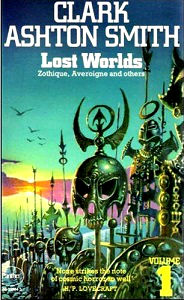
Clark Ashton Smith (13 januari 1893 – 14 augustus 1961)
Cover
Onafhankelijk van geboortedata
De Amerikaanse schrijver Michael Carroll werd geboren in 1965 en groeide op in een wijk van Fort Caroline (nu Jacksonville), Florida. Zie ook alle tags voor Michael Carroll op dit blog.
Uit: After Memphis (Little Reef and Other Stories)
“I had very good insurance through Perry and my co-pay was only fifteen dollars. My therapist, an older man I’d only slowly deduced was gay too, had said that he thought I had what was called an “observing ego:’ meaning I worried about what others might be thinking and themselves going through—that I tried to see their side, which had been my role as the younger brother caught in the family situation when I was sixteen. I had tried to see every side, was my problem, and Bob, my shrink, was never too hard on me. He said that he trusted me as an “accurate historian,” and begged me to proceed, nodding, waiting for me to get it all off my chest, not just family stuff but stuff related to Perry—groping my way toward my next, and next, breakthrough. And it had helped. I can’t say why, except that I’d paid a man to listen to me and paid money to listen to myself and take myself seriously, so now all of these issues were old hat to me, dead and buried in effect. But here we were again. I was the younger brother. As a kid I’d taken it as my job to stay out of Jeff’s way but snicker at his jokes, listen to him talk about his taste in music, which at the time I didn’t get. I hadn’t liked alcohol, either, but to curb the boredom I started toward the kitchen—and ramped up the tough love a notch or two. “And whatever else happens,” I said, “I guess it’s no good being bitter. You’re getting a divorce—right?—so you can cut things cleanly and get the past behind you so you can move on and try to be happy, right? You say everybody made mistakes. Everybody makes mistakes. And to be honest, I’ll just admit this right now, don’t know how you’re going to react but I’m going to go ahead and say it, man—I’m looking forward to your being legally single. I think this is what you need, what you want, and what you’re looking forward to. But it’s really happening, right?” “It is happening; said Jeff, “for damn sure I could see him nodding in the earnest, vigorous way I’d readily recognize. I’d seen him nod like that in Memphis, where our parents had retired, when Jeff had first opened up about the divorce idea, and when we were talking about our father’s hospitalization, the “eventualities”—because Jeff was big on euphemisms, while at the same time talking turkey post-evangelical style.”
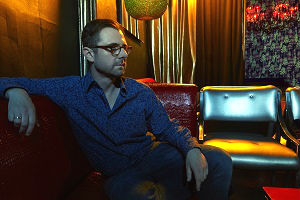
Michael Carroll (Fort Caroline, 1965)
Zie voor nog meer schrijvers van de 13e januari ook mijn vorige blog van vandaag.

